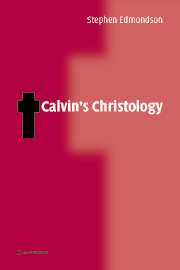1 - Christ as Mediator
Published online by Cambridge University Press: 22 September 2009
Summary
Toward the end of his literary career, Calvin was dragged into a theological skirmish by the Protestant churches in Poland. A wandering Italian theologian, Francesco Stancaro, was teaching that Christ mediated between humanity and God only in his human nature and not in his complete person as the God–man. The theological tradition of the Church had spoken of Christ's mediation in many ways, but at the heart of all of them lay the notion that God sent Christ into the world in order for Christ to stand between God and humanity and to serve as the agent or means or instrument (and the noun one chooses depends upon one's theology of mediation) by which humanity is reunited to God. Thus, Stancaro, while acknowledging that both a divine and human nature are united in Christ's one person, argued that the divine nature, because it was shared equally and fully by the three persons of the Trinity, cannot mediate or stand between God and humanity – to say that the Son mediates between the Father and humanity in his divinity would imply that he was subordinate to the Father in his divinity, and this would be the Arian heresy. Other theologians in Poland, however, argued that Stancaro was merely renewing the Nestorian heresy by limiting Christ's mediation to his humanity apart from his divinity. The hypostatic union is apparently dissolved by Stancaro's doctrine, they claimed.
- Type
- Chapter
- Information
- Calvin's Christology , pp. 14 - 39Publisher: Cambridge University PressPrint publication year: 2004

